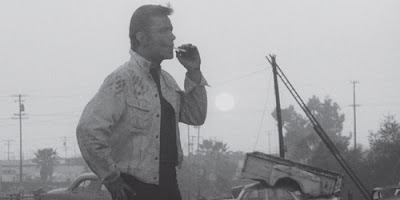Bowman doesn't trust anybody, which in most movies would be his flaw to overcome. Even Jolene, his doting teen girlfriend, gets on his nerves after a while. He gets cranky the night before a big race and accuses her of latching onto him because she wanted to be with a winner. Jolene, played by Beverly Washburn - who with her pixie haircut and false eyelashes looks like she just stepped out of a Laugh-In party scene - was the only kind person in the movie; when Bowman yells at her, we know he's an ass.
And consider the scene where Bowman and Hawk first meet. Hawk goes on a rambling monologue about how the racing business takes a certain kind of crazy character to succeed, and Hawk, because he's the craziest of 'em all, always wins. "When they see me coming through that intersection," he says, "they just naturally back off, cos they know I ain't gonna stop for nobody!" When Hawk is done with his tirade, Bowman quietly asks, "Where can I get me a car?" Is Bowman stirred by the idea of competition? Or does he just want people to know he's crazy, too?
Hill and cinematographer Austin McKinney make the figure 8 races, shot at the Ascot Park Speedway in Gardena, California, look nightmarish. In fact, this is one of the most stunning black and white movies to come out of the late '60s, with some scenes shimmering like the best film noir. The black and white caused difficulties with distribution since drive-ins at the time had adapted an all-color policy, but this is one sharp looking movie. A scene at an automobile graveyard, where broken car parts are stacked up like a mountain of bones, looks haunted and surreal, as does a parade of dune buggies shot at the Imperial Sand Dunes in Glamis. The dive bars, liquor stores, and seedy hotels where the drivers congregate look like glowing markers on the road to hell.
There's a sexual dysfunction in the movie, too, with the drivers often leaving their women adrift in order to focus on racing. Sure, Hawk is usually seen on the dance floor with one or two women, and he's bold enough to yank a go-go dancer right off the stage, but the ease with which Jolene leaves him for Bowman suggests there wasn't much in their private life worth preserving. And Bowman eventually leaves Jolene cold, too. The wife of a hotshot driver, played by a very young and lovely Ellen Burstyn, complains that racing has taken her husband "body and soul. And I emphasize body." Willard has no woman; he only has eyes for young men he can throw into the deadly figure 8 course.
Bowman eventually reveals himself to be as cold-hearted as Willard, and as demented as Hawk. All of the drivers working for Willard are simply addicts. They're addicted to action, they're addicted to danger, and they're addicted to winning. Willard, devious and manipulative, plays one against the other, until they're all out for blood.
Though Davalos plays Bowman with a punk's swagger and his hair swept up like James Dean's in Rebel Without a Cause - indeed, he'd played Dean's brother in East of Eden, and at certain angles he even bears a resemblance to Johnny Depp - he was already 36 by the time of Pit Stop. Seasoned by years of television appearances, he walks a fine line between clean-cut leading man and jerk. When he befriends a much older driver with hopes of learning some tricks for survival, it looks like he may be a nice guy, after all. But it's not that sort of movie.
Hill purportedly saw figure 8 racing and thought it was so loony that he wanted to make a movie about it. Years later he would tell Ultra FilmFax, "The action scenes were the real thing. Not staged. It was a real slice of Americana." His enthusiasm shows in the racing footage, which has the bluntness of bare-knuckle boxing. He'd go on to make several movies in many different genres - he's most revered for his two Pam Grier features, Foxy Brown and Coffee - but Pit Stop may be his best feature. His other films are sometimes marred by corny jokes and slapstick. Here, he's dead serious.
I like that it's in black and white. The races take place at night, and the spotlights on the track make the proceedings seem ghostly. The men may or may not have death wishes, but like astronauts and bull-riders, they know their passion comes with a possibly fatal price. "Everybody I raced with is dead now," says one old timer. There's a sense of shame in his admission, as if to survive in this racing world is a kind of insult to those who don't.
Pit Stop moves like an old juvenile delinquent film of the '50s, as if filmed by a Godard wannabe. I haven't even mentioned the excellent musical score, all grinding guitar riffs by the remnants of a Seattle psychedelic outfit called The Daily Flash, or that the project was financed by Roger Corman, who was making a lot of hippie movies at that time to grab the youth market. By not looking or acting like other films of its era, without a flower child or draft dodger in sight, Pit Stop feels more subversive than other movies that tried twice as hard.

No comments:
Post a Comment